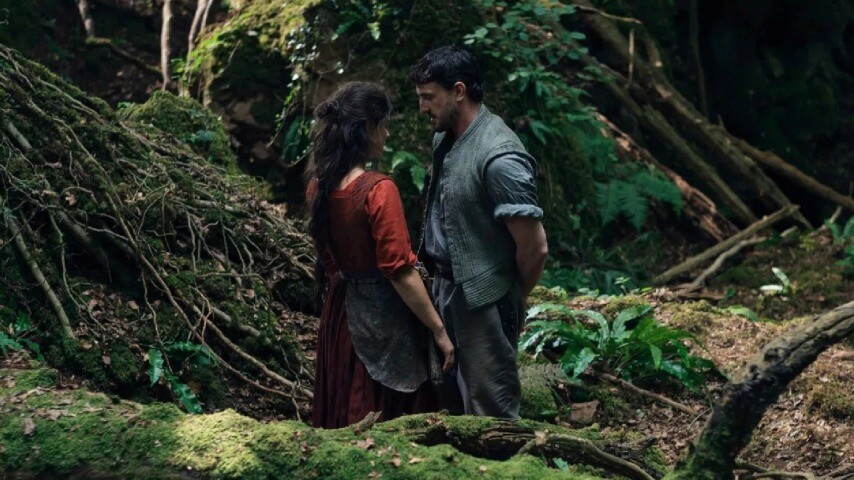It’s rarely a good idea to let others’ reactions frame our own. But it’s also true that Hamnet itself is, to some degree, all about prompting reactions based on outside knowledge. On its face, Shakespeare’s play Hamlet has little to do with the subject of Hamnet, which is grief over the loss of a child. That’s probably why the movie’s tiny opening crawl informs us upfront that the troubled protagonist of that play has a name that was considered more or less interchangeable with the name Hamnet, which is also what Agnes and William call their only son. From this smidge of information, Zhao’s film (co-written with Maggie O’Farrell, the novel’s author) proceeds into speculation about the courtship between Agnes, a free-spirited farmer’s daughter, and William, a local tutor pressured to join his family’s business.
Once married, they have a daughter, Susanna (Bodhi Rae Breathnach), followed by twins, Judith (Olivia Lynes) and Hamnet (Jacobi Jupe). It is Judith whose immediate survival is in question upon birth, and more or less as soon as that baby miraculously breathes, Agnes starts fretting over her continued health. Eleven years later, Judith and Hamnet both seem to be thriving on the family’s farm, though their father is spending less time there; it’s around this point that we formally learn of his success as a playwright, as Agnes lets him travel to London for extended periods to attend to a career she doesn’t seem to have much personal interest in. They talk of a prospective new home, neither old farm nor fully city-integrated, in Stratford-upon-Avon. During one of William’s absences, Judith falls ill, appearing to fulfill the paranoia Agnes has felt about her younger daughter. But fate takes a different turn.
Before and after the tragedy, Zhao and O’Farrell include references to other Shakespeare works, perhaps most noticeably when twins Judith and Hamnet switch places—first in play, during happier times, and then with grim dramatic irony. Like the end of Shakespeare In Love, this alludes to the more comic plot of Twelfth Night. Call this version Shakespeare In Loss. Unofficially sequelizing that movie’s youthful and bittersweet romance, Hamnet‘s family melodrama is compelling, especially when it’s rooted in Buckley’s raw performance. Mescal is, by design, a bit more remote. “Speaking with people is sometimes difficult for me,” William tells Agnes when they first meet. Agnes, on the other hand, is described early on by William’s mother (Emily Watson) as the child of a forest witch, a distinction that appears factually inaccurate but spiritually correct. Often smudged with dirt, she’s something of a Terrence Malick-style heroine, though the movie doesn’t see her as quite so mysterious. If the part reads a little ostentatious as an actor’s showcase, it’s hard to argue with the sheer ferocity Buckley brings to it—who would want to get into an argument with a wail of grief?
At the same time, is it churlish to wish for a little more of the freedom of Nomadland? In that film, it felt like Zhao genuinely explored her landscape, even as she remained aware of the story she was telling. Hamnet still combines a Malickian observation of the natural world with character-study close-ups. But the camera movements often feel newly restrictive, fixing the frame even as it captures Mescal and especially Buckley in nature. The more demonstrative discipline is a surprise, and a mild disappointment. Maybe it’s why the movie feels like it’s missing something from its midsection, before and especially after the seismic personal tragedy the Shakespeare family experiences. The relationship between the famous married couple at its center sometimes threatens to come across as perfunctory.
The normal confines of a film review would have to leave off right around that void. But that would do a disservice to Hamnet, which despite the general lack of interest in behind-the-stage maneuvering or signposting does build to a production of Shakespeare’s similarly-named masterwork. One of Zhao’s boldest choices involves the expectation that she might continue to depict a tragic flipside to Shakespeare In Love, where the mechanics of Romeo And Juliet were playfully woven into its fictionalized creation. Instead, the connection between a sweet-natured 11-year-old boy and the vengeful Prince of Denmark is allowed to remain a little oblique and never shoehorned into an easy metaphor. Yet there is artistic catharsis in that tenuous connection, too; the project’s whole jumping-off point is that the naming of Hamlet so closely to Shakespeare’s real-life son is too significant to ignore. The uncertain and the undeniable come together in a stunning final act of communication that feels more like communion. In traditional terms, it could simply be described as a tearjerker. Like Buckley’s performance, though, it’s richer than that, a cross between an out-of-body experience and a full-body sob. Some will likely resist it on those grounds, understandably. But, again, framing our reactions with the feelings of others is rarely a good idea, and despite its moments of faltering, Hamnet hits like an emotional wrecking ball—devastating as it clears its path.
Director: Chloé Zhao
Writers: Chloé Zhao, Maggie O’Farrell
Starring: Jessie Buckley, Paul Mescal, Emily Watson, Jacobi Jupe, Olivia Lynes, Joe Alwyn
Release Date: November 26, 2025

 Keep scrolling for more great stories.
Keep scrolling for more great stories.
